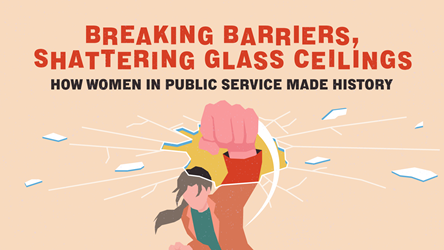Towards An Inclusive Workplace

At the Lee Kong Chian Reference Library in the National Library Building on Victoria Street, Library Service Assistant Dorothy Tang can often be seen walking through the various floors of the reference section to shelve and check that books are in their right places.
Dorothy is one of about 30 persons with special needs who works at the National Library Board (NLB).
After having tried jobs such as data entry and warehouse stocking, Dorothy, who is on the autism spectrum, took up her current role at the NLB in January 2020.

“Working in a library really suits me,” she said. “The work taps on my strength of being able to pay strong attention to detail, especially when I shelve books and do shelf-reading.”
A long-time partner of the Autism Resource Centre (ARC), the NLB signed a Memorandum of Understanding in 2015 to set up a digital services centre at the Enabling Village.
This provided employment for 15 people on the autism spectrum to do digitisation work, such as scanning print materials and post-processing work (e.g., cropping material), before doing final quality assurance checks.
Besides the digitisation work, others in the team on the autism spectrum like Dorothy help to sort, shelve and arrange the library materials at Lee Kong Chian Reference Library.
Boosting Training, Support and Resources
To support persons with disabilities (PwDs) in taking on roles in the NLB, its staff split the PwDs’ tasks into simple steps and specific instructions, and provided step-by-step training and documentation to equip them with the necessary skill sets.
Over time, some NLB staff have also gone the extra mile to help their colleagues.
For example, in NLB’s Resource Discovery and Management Division, a team member would sit next to a deaf colleague during meetings and write down the discussion points so that the latter could follow and participate. Other members would also look directly at this colleague when speaking, so that she can lip-read.
The entire team even took up a sign language course so that they would be able to communicate better with their colleague.
Video by: Teck Lim
One team member, Mr Mohammed Shafie Haja Mohaideen, Associate Librarian, Resource Discovery and Management Division, “The [sign language] course [also] gave us insight into how challenging non-verbal communication can be, and how to understand and be understood.”
This helped them better understand how their deaf colleague deals with the challenges at work, as they continue to find ways to make the workplace an inclusive one.

To recognise NLB’s efforts in creating an inclusive workplace, SG Enable, the agency for enabling PwDs, conferred the NLB with the Enabling Mark (Gold) award for two years from 2021 to 2023.
The Punggol Regional Library opened the first two of its five floors on January 30, 2023. It has facilities that cater to PwDs, such as an Accessible Collection and assistive technology.
To equip NLB staff with the necessary skills to serve PwDs at the library, the team also went through several training sessions, including hands-on activities such as guiding a person with visual impairment to a public library.
Supporting PwDs’ Career Growth
In 2021, VITAL, the Public Service’s central agency for corporate shared services, was also awarded the Enabling Mark (Gold) by SG Enable.
PwDs employed by the agency have the opportunity to hone both their hard and soft skills.
Mr Chew Jian Xiong, an Executive in the Digitalisation Services department, is one such staff member. He is part of a team digitalising files for 38 public agencies.
After joining VITAL, Jian Xiong, who has autism, went through a two-part training with support from an assigned ARC Job Coach. “I learnt both hard skills based on my department’s requirements and soft skills such as work habits and workplace communications,” he said.
He also took up a four-week Robotic Process Automation online course recommended by VITAL and run by business automation service UiPath.
This allowed him to develop software skills and improve productivity by building virtual bots to reduce manual work. He has worked with colleagues to automate the manual search of records with a bot, which will save about 600 man-hours a year.

At VITAL, staff attend workshops by the ARC to learn how to better communicate with their colleagues on the autism spectrum. For example, when talking to officers with autism, they should avoid using long sentences, use visual aids where possible, and be clear when giving instructions.
Jian Xiong’s supervisor, Mr Vernon Tay, oversees eight officers with autism. As officers with autism may take longer to respond to questions, their teammates have to be patient and gently get their attention back to the topic at hand if they get distracted, he said.
“Every officer on the autism spectrum has a different personality, needs and working style,” Vernon added. So VITAL teammates and supervisors make an effort to better understand each individual and adapt to their needs.
The Next Step
Although there are more employment opportunities for PwDs today, misconceptions about their abilities still persist.
According to Dr Justin Lee, a senior research fellow at the Institute of Policy Studies, employers may use business reasons to justify prejudiced hiring practices – such as preventing PwDs from holding customer-facing roles.
To Dorothy, this is one of the biggest barriers that needs to be overcome: the perception that PwDs are less capable and cannot contribute to society.
“We have our own goals and dreams, just like anyone else. We have our own strengths and abilities, and can do a great job with support and training,” she shared.
With more opportunities available now for PwDs, she hopes that those who are capable can be better informed of these opportunities and given an equal chance to contribute and do more.
For agencies interested in hiring PwDs, the NLB has a few pointers to share. In addition to considering the mobility conditions, such as where they are seated in the office, agencies should also consider their communication methods, simplify work processes or provide specific office equipment to address the needs of PwDs and help them integrate into the workplace.

Ms Daphne Ong, Director, People Matters Division, NLB, said: “In NLB, we value and care for every officer who comes through our doors, and want to ensure they are in a supportive environment where they can contribute to the best of their abilities. When everyone can play their part, in their own special ways, we can better deliver our services at our libraries and archives.”

For VITAL, the key to successful inclusive hiring is to view it as a mutually beneficial process for PwDs and the organisation.
Good skills-to-job matching, for example, can lead to higher productivity and positive business outcomes. Similarly, creating abundant opportunities for upskilling and upward mobility improves the employee experience for the PwDs while enabling them to progress in their careers.

To get more stories like this, subscribe to the Challenge Telegram channel.
- POSTED ON
Feb 9, 2023
- TEXT BY
Hidayah Md Sham
- PHOTOS BY
Teck Lim









